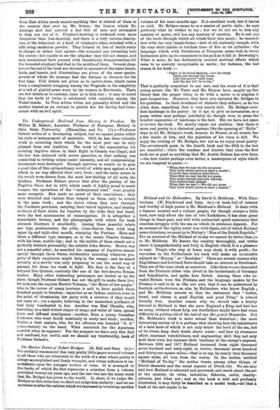Holland and the Hollanders. By David S. Meldrum. With Illus-
trations. (W. Blackwood and Sons. 6s.)—A book full of interest and worthy of high praise is Mr. Meldrum's Holland. It deals with a famous country and a valiant people, for though always a little land, now only about the size of two Yorkshires, it has done great things in times past, and still with undaunted spirit maintains that ceaseless struggle with the sea on which its existence depends. For an account of the eighty years' war with Spain, out of which Holland came victorious, we must go to Motley's " Rise of the Dutch Republic." For an account of the Holland of to-day we cannot do better than go to Mr. Meldrum. He knows the country thoroughly, and writes about it sympathetically and fully in English which it is a pleasure to read. People who stay at home may study it with profit ; for travellers in the Netherlands his book will make an invaluable adjunct to "Murray" or "Baedeker." There are several reasons why Englishmen and Lowland Scots should take an interest in Dutchmen. They are of the same stock as ourselves. Like them we are descended from the Teutonic tribes who dwelt in the borderlands of Germany and Scandinavia, and spoke Low Dutch. Among those who in- vaded Britain were the Frisians, and the language spoken by the Frisians is said to be so like our own that it can be understood by Scottish cattle-drovers, as also by Hollanders who know English ; and Mr. Meldrum assures us that the statement that " butter, bread, and cheese is good English and good Fries," is almost literally true. Another reason why we should take a kindly interest in Holland is that she gave England a King and lent her an army, without whose help our forefathers might have had some difficulty in getting rid of the last of our Bei gratid Monarchs. But Mr. Meldrum's work is more actual than historical ; the most interesting section of it is perhaps that showing how the inhabitants of a land most of which is not only below the level of the sea, but of its rivers, keep their heads above water ; and how by strenuous effort, incessant watchfulness, and engineering skill they not only hold their own, but increase their territory at the enemy's expense. Between 1833 and 1877 Holland increased from eight thousand seven hundred and sixty-eight to twelve thousand seven hundred and thirty-one square miles,—that is to say, by nearly four thousand square miles, all won from the waves. In the section entitled "Holland of To-day" the author treats, among other things, of Dutch character and the social aspects of Dutch life. We are also told how Holland is educated and governed, and much about the art of the country, its cities, industries, fisheries, cattle, charity- colonies, and what not ; and as the book is well and profusely illustrated, it may fairly be described as a model book,—all that a book of the sort ought to be.


















































 Previous page
Previous page